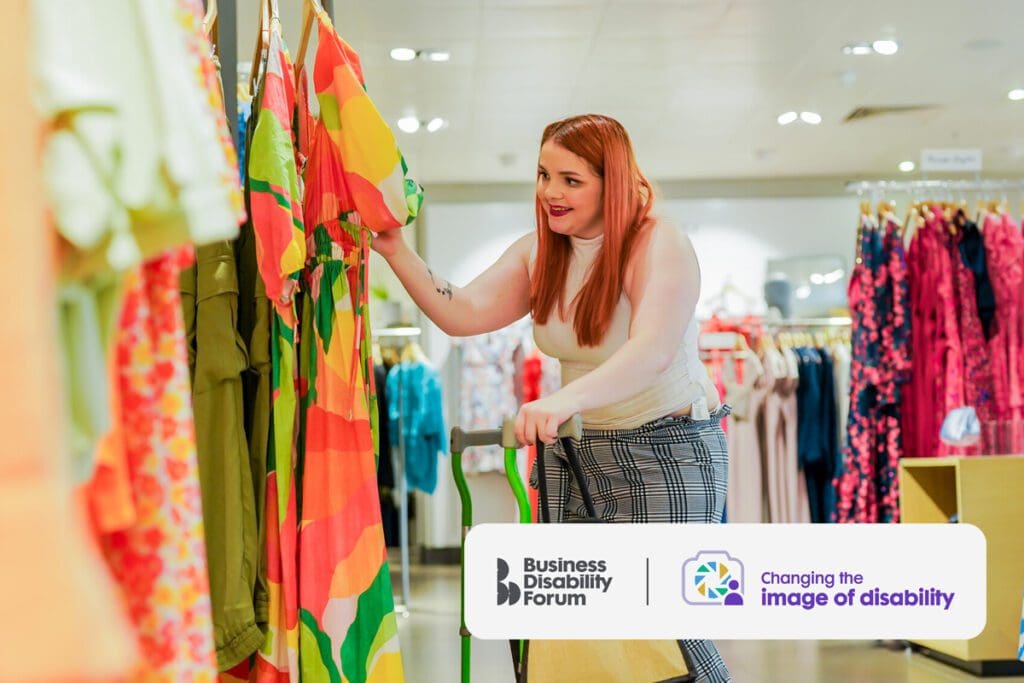Our campaigns
We are Business Disability Forum. We believe the 26 million people in the UK and over 1 billion people worldwide with disabilities and long-term conditions enhance the social and economic health of our societies.
We help remove barriers in business structures and Government that prevent disabled people from thriving and making their contribution to the world.
We bring the experience of disabled people to business through our campaigns:
- Related content
Current campaigns
Identity
We are reclaiming the word disability from its negative associations and connotations and celebrating the fact that this is about all of us. We are talking about disability and to disabled people in all walks of life and at every level in society.
What is your identity?
Identity means very different things to different people and it can change many times in a lifetime.
For many people a big change in identity can come from being someone who doesn’t think of themselves as having a disability or long-term condition to someone who does.
This could be by:
- Receiving a diagnosis that perhaps finally makes sense e.g. Asperger’s or dyslexia which may or may not be.
- It can also be a diagnosis of an illness or a change in a condition.
- For some it can be a realisation that they are ‘different’ because of a disability but they didn’t realise this before.
- These moments of change can happen in everyone’s life and many if not most people have a disability or long term condition or certainly know someone or are close to someone that does. It’s just a new normal that everyone adjusts to over time and in different ways.
Having a disability is normal. It might just be a new normal for the individual. It is society and employers that need to recognise that having a disability doesn’t make the person “one of them”. They are one of us – the majority over time not a minority
Our research shows:
- Disabled people do not see visibly or openly disabled people in positions of leadership that they can aspire to in the corporate world or in the media.
- Disabled employees won’t identify as disabled and might wait until they have to tell someone about their disability because they need something to be done differently.
- Employers and business are not always keeping up with the attitudes of younger people who have grown up with legislation outlawing disability discrimination and have expectations that business needs to meet. This can result in brand damage and a loss of valuable young talent.
- Customer facing businesses risk losing customers who fail to see themselves represented in their advertising, the people who work for them or in the products themselves. This ranges from retailers to media outlets.
- Explore our photo gallery to see how we are changing the narrative:
What we are doing
Read our latest blogs on mental health and Looking Beyond Labels
We are bringing people from the business world together to share their experiences and learn from each other.
Our annual film festival for disabled students explores the theme of identity and what it means to be disabled
What you can do
- Run your own internal campaigns to celebrate disability – we can help you and feature them on our website e.g. Barclays See Me Campaign and the Fujitsu and Accenture campaigns
- Listen to your staff disability networks
- Appoint a Senior Disability Champion who speaks frequently and openly about disability.
- Have a continuous feedback loop from your disabled staff to your senior teams
- We are really keen to learn about your experiences of disability and identity. Whether it’s a selfie, a poem, a short video or a blog you’d like to write.
To get involved in our campaign, please email us Going Places: Getting in, getting on, getting there
Going Places – Employment
Barriers and their impact
Disabled people face daily barriers getting into employment, getting on in their careers and even getting to work.
Nearly half as many disabled people are unemployed compared to people without a disability. From inaccessible online recruitment processes to unnecessary requirements in job descriptions disabled people are excluded from demonstrating their talent and potential to employers.
Targeted career development opportunities to unlock the potential of future disabled leaders is scarce and disabled people in employment are more likely to report higher levels of dissatisfaction with their employer,
Getting to work or traveling for work can be a daily challenge for disabled people faced with inaccessible public transport. From steps and broken lifts to announcements that they cannot hear or see the daily commute can be a reason not to accept a job offer or to be unable to stay in work.
These are not just problems for disabled people; they are problems for employers and the UK and global economy.
Employers are missing out on the best talent. Numerous studies have shown that having a diverse workforce directly affects. the bottom line of business. Employers cannot afford to overlook the potential of a significant proportion of the population – particularly in countries where the population is ageing. The majority of disabled people acquire their disability during their working life. Having them drop out of work is just not an option for a thriving business or economy.
What can you do?
- Join us and help us to help you become disability smart. Use our guidance and training and let us utilise your collective power to change policy and improve access for everyone
- Appoint a Senior Champion to help drive change from the top.
- Develop a staff disability network and learn from your own workforce and then share your learning with others for the collective good of our world.
Going Places – customers
The spending power of disabled people is estimated at £250 billion and yet many still find it almost impossible to get into buildings and websites, get on with everyday activities or get there on inaccessible public transport.
Despite legislation in the UK and in countries across the globe many shops, restaurants and buildings exclude disabled people, their friends and family from spending their money with them. Rapid advances in technology are made every day and yet websites are still designed to exclude disabled people from digital revolution.
All this means that getting on with everyday life from shopping to paying utility bills and banking or even getting an education can be an everyday challenge for disabled people.
Inaccessible public transport or attitudes that exclude and discriminate mean that traveling for leisure is a chore rather than a vacation for many disabled people.
These are problems disabled people face on a day to day basis but the problem is not theirs alone. Inaccessible businesses are missing out on the spending power of not just disabled people but their friends and family as well. Disabled people want to shop, eat and drink out, go on holiday, use leisure facilities and visit attractions with family and friends. Businesses that exclude them risk losing a significant customer base. Disabled people also have the right – legally and morally to manage their own money and households and be active participants in their local communities and society.
What we are doing?
- We have tools to help from guidance and training for customer facing colleagues to conducting end to end barrier analyses for people with different types of disabilities. We will help you identify any barriers your customers might face and find ways to remove them so that your business is ready to welcome disabled customers.
- Our events and roundtables enable you to learn from others in your industry and those in other sectors.
- Our policy and research work gathers the experiences of business and people with disabilities and long-term condition to influence change
- Our events, workshops and roundtables help employers learn from each other and from those who have developed innovative and exciting initiatives.
What can you do?
- Join us and help us to help you become disability smart. Use our guidance and training and let us utilise your collective power to change policy and improve access for everyone
- Conduct systematic audits of your premises, websites and apps looking for and removing barriers and most importantly ensure that you think about accessibility for everyone from the outset. Reject refurbishments or premises that are not accessible and include disabled people in the design and user testing of websites and online applications to ensure they work for everyone. Retrofits are expensive. Make them unnecessary. Find out more from about how from our Technology Taskforce.
- Train customer facing staff to provide the best possible customer service to all your customers. All too often it is fear of doing or saying the wrong thing rather than malicious intent that lead staff to ignore disabled customers or provide poor customer service. Get it right for disabled customers and you’ll get it right for everyone.
- Develop a staff disability network and learn from your own workforce who are also your customers and service users and then share your learning with others.
If you require this content in a different format, contact enquiries@businessdisabilityforum.org.uk.

